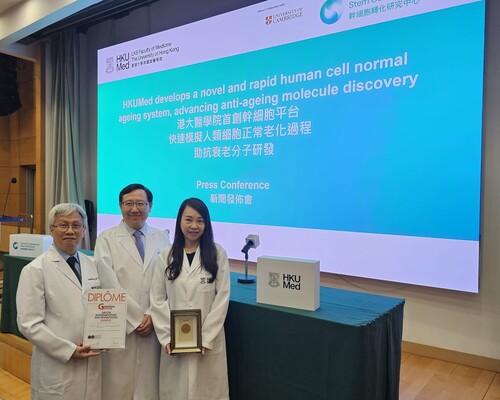Knowledge Exchange
Jun 28, 2024
Press release: HKUMed develops a novel and rapid normal human cell ageing system, advancing anti-ageing molecule discovery
Press Release (2024-06-28):
Source: HKUMed develops a novel and rapid normal human cell ageing system, advancing anti-ageing molecule discovery
HKUMed develops a novel and rapid normal human cell ageing system, advancing anti-ageing molecule discovery

HKUMed develops a novel and rapid normal human cell ageing system, advancing anti-ageing molecule discovery. From left: Professor William Yeung Shu-biu, Professor Liu Pengtao and Dr Cherie Lee Yin-lau.
A research team from the Centre for Translational Stem Cell Biology (CTSCB) under the LKS Faculty of Medicine at the University of Hong Kong (HKUMed) has developed the world's first cellular system that can be used to rapidly discover molecules for anti-ageing. By harnessing their patented technology in Expanded Potential Stem Cells (EPSCs), the team successfully separated EPSCs from human cells and further differentiated them into human trophoblast stem cells (hTSCs), a type of young cell that is found in the placenta during pregnancy. The natural development of these cells mimics the human ageing process, enabling the establishment of a novel cellular model in vitro for analysing anti-ageing molecules. This pioneering invention, which has opened new frontiers in studying and understanding ageing mechanisms, received the 'Gold Medal' at the International Exhibition of Inventions of Geneva this year.
Background
Ageing is a complex biological process with profound health implications. Scientists have traditionally studied ageing using model organisms such as fruit flies and mice, or through cellular models that do not accurately represent human physiology. Researchers have discovered that the development of the placenta trophoblast closely resembles natural ageing processes, providing unique insights into ageing.
The research team, led by Professor Liu Pengtao, Professor of the School of Biomedical Sciences, and Managing Director of CTSCB, at HKUMed, has developed EPSCs from mice, pigs, cows and humans. These new stem cells across species have the capacity to produce almost all types of cells found in animals and humans' bodies and are useful for studying human diseases and regenerative medicine. With the uniqueness of EPSCs, the stem cell acts as a platform for different biomedical and translational research, enhancing the development of technology in the field. With the support of the InnoHK flagship programme (Health@InnoHK) under the Innovation and Technology Commission of the HKSAR Government, CTSCB strives to apply their state-of-the-art stem cell technologies to both commercial successes and healthcare benefits.
Leveraging this cutting-edge technology, the research team introduced a pioneering approach by developing an ageing-emulated biosystem derived from hTSCs. The biosystem accurately displays major ageing hallmarks, such as genomic instability, epigenetic modifications, telomere shortening, and cellular senescence, thereby establishing an accelerated ageing model. This robust tool holds promise for advancing deeper exploration and understanding of ageing, expediting the discovery of anti-ageing molecules, and improving human health and longevity.
Research findings and significance
Mimicking ageing processes observed in trophoblasts during pregnancy, the biosystem derived from hTSCs represents a groundbreaking advancement in ageing research. By accelerating the ageing process, the researchers were able to observe key hallmarks of ageing. While natural human ageing takes more than 60 years, this in-vitro biosystem can replicate it in just six days in the laboratory. This model provides a controlled environment for studying the molecular and cellular changes associated with ageing and understanding how they contribute to age-related diseases.
This research significantly enhances the understanding of normal ageing mechanisms by replicating age-related changes during trophoblast maturation. This enables researchers to unravel the molecular pathways and regulatory mechanisms that drive cellular ageing. These findings are crucial for developing targeted interventions against ageing and age-related diseases.
Professor Liu Pengtao, who led the research, said the hTSC-based biosystem provides a robust platform for identifying potential anti-ageing treatments. 'Researchers can systematically evaluate the impact of various compounds on ageing-related traits with this accelerated model, thereby expediting drug discovery efforts. This approach offers promising avenues for developing novel therapeutics that counteract ageing processes,' he said.
'Utilising hTSCs to model ageing represents a transformative approach, with broad implications for biomedical research and clinical applications. By accelerating ageing research and facilitating the discovery of effective treatments, this innovative biosystem has the potential to significantly contribute to the fields of regenerative medicine, gerontology, and preventive healthcare. Its potential to enhance human health and longevity is immense, offering hope for a future where ageing can be better understood and controlled,' added Professor Liu.
About the Research Team
The award-winning research was led by Professor Liu Pengtao, Professor, School of Biomedical Sciences, and Managing Director, CTSCB, at HKUMed. Other team members included Professor Gordon Dougan, Emeritus Professor, Department of Medicine, the University of Cambridge, and Co-Director, CTSCB; Professor Liu Fang, Senior Scientific Director, CTSCB; Dr Feng Zhen, Postdoctoral Fellow, and Dr Shen Yong, Project Manager, CTSCB; and Yoyo Lee and Jiang Wenxin, PhD students, School of Biomedical Sciences, HKUMed.
Media Enquiries, please contact:
Please contact LKS Faculty of Medicine of The University of Hong Kong by email (medmedia@hku.hk).

